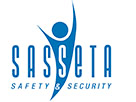Frequently asked questions
Our sector has an elevated risk of injury and we cannot afford to have learners on site without cover, in the event of injury.
COIDA takes an average of 21 days to obtain, so it is advisable to always have this on hand. It is good practice to protect employees and learners in the event of injury while at your premises.
As a public institution, we may not do business with entities whose tax matters are not in order.
Our policies require that preference be given to organisations that comply with BBBEE requirements.
Discretionary grants are awarded to legal entities and some grants are only available to certain types of entities, for example NPO’s and trade unions.
This is one way the SETA can confirm that the company a) is legally compliant b) is correctly registered against SASSETA (SETA 19).
SASSETA policy is to give preference to our stakeholders, including trade unions, NGO’s and Cooperatives operating in our sector. Due to very limited funding, SASSETA is unable to fund companies registered elsewhere.
SASSETA publishes its DG policy, which includes its funding framework, clearly articulating inclusions, preferences and exclusions. Except in the case of persons living with disabilities, SASSETA will not exceed the grant amounts stated in its policy.
SASSETA recommends a ratio of one (1) Assessor for every 25 learners applied for (for Training Provider) and a ratio of one (1) Subject Matter Expert (a person who holds the qualification him/herself and has vast experience) for every five (5) unemployed learners applied for (for Employers).
This is important so that a learner / intern, based at a workplace, can obtain workplace-based experience under the supervision and guidance of a qualified person
Submission of the WSP/ATR or Pivotal Plan (for small companies employing less than 50 employees) is a legislated prerequisite to accessing the discretionary grant.
With public funds, valid documents must be produced for audit purposes. Copies that are not clear, not certified, or certified more than three (3) months before the closing date will be considered invalid.
All fields on the application form are required. Where these are not applicable, rather indicate so than leave blank.
All compulsory requirements assist in the adjudication process. A checklist is attached to each form – we suggest you have at least two people go through your application diligently before submission.
For each new funding window SASSETA aligns application forms to evaluation requirements and the adverts in order to provide sufficient detail to make a decision.
There are two application forms in the current funding window:
1) Employer application form – to be used by private employers, community based organisations, NGO’s, Cooperatives, trade unions and public training institutions who wish to apply for grants to train their employees / unemployed persons.
2) Provider application form
SASSETA researches and updates the skills requirements of the sector annually, primarily through WSP’s submitted, focus groups and interviews. Employers are urged to participate in these to ensure that the SETA correctly forecasts demand in order to plan for the supply of skills.
